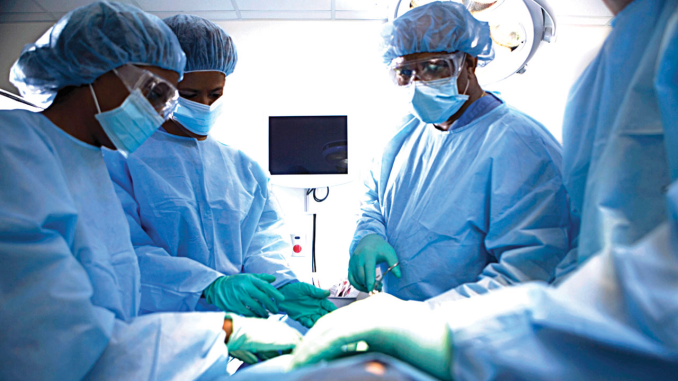While the issue of patient safety has gained global attention, with efforts directed at reducing medical and human errors, improving healthcare outcomes, and ensuring that hospitals provide secure environments for treatment, many factors continue to pose significant risks to patient safety in Nigeria. ...Tap To Read The Full Story Here | ..Tap To Read The Full Story Here...
1.2.2. SEE. VIDEO: MAN. KILLED. MOTHER. FOR .RITUALS
One of the significant factors is the need for healthcare infrastructure and resources. Many hospitals, especially in rural areas, need to be equipped with outdated medical equipment and insufficient facilities to meet the growing population’s health demands.
LEADERSHIP learnt that even in tertiary hospitals, patients often encounter long wait times for essential diagnostic tests or surgeries due to a shortage of skilled healthcare workers and limited resources. This delay in treatment can worsen patient outcomes, increasing the risk of avoidable complications or fatalities.
Nigeria faces a severe shortage of healthcare professionals, exacerbated by a persistent brain drain. Many doctors, nurses, and other medical practitioners leave the country for better working conditions and pay abroad.
The World Health Organization (WHO) recommends a ratio of one doctor per 600 patients. Still, this ratio is alarmingly skewed in Nigeria, with some estimates suggesting a ratio of one doctor to 2,500 patients. This shortage compromises patient care, leading to overworked and overstressed medical staff, increasing the likelihood of medical errors.
Medication errors, from incorrect prescriptions to dispensing the wrong drugs, are a common patient safety issue in Nigeria. The lack of stringent regulation on pharmaceutical practices, coupled with counterfeit drugs flooding the market, places patients at high risk. Healthcare providers sometimes face challenges in verifying the authenticity of drugs, leading to adverse effects on patient health.
Meanwhile, healthcare workers have warned of more medical errors, even though a recent study puts the latest prevalence rate at 89.9 per cent.
The study, ‘Documentation of Medical Errors in Nigeria: A Review,’ analysed seven electronic databases of studies on medical errors by healthcare practitioners in Nigerian hospitals. Its findings showed a high prevalence of medical errors, ranging from 42.8 to 89.8%.
Reacting to the study’s findings, medical doctors have linked the high prevalence rate to long working hours caused by the ‘Japa Syndrome’ and called on the government to employ more doctors to replace those who have left the country for greener pastures.
The World Health Organisation (WHO) predicts a 10 million shortage of health workers by 2030, mainly in low-income countries like Nigeria. According to the latest figures from the Federal Ministry of Health and Social Welfare, Nigeria has a skilled health worker density of 1.83 per 1000 patients, far below the WHO recommendation. Factors contributing to this include low production of health workers, poor management, and political and economic crises.
Doctors who spoke to our correspondent averred that the long working hours are torn not only their health but also their ability to carry out their functions effectively. They warned that frequent burnout leads to many diagnosis and treatment errors.
According to Dr Bimbo Olamide, who works at one of Nigeria’s public hospitals, the regular working hours are intended to be from 8:00 a.m. to 4:00 p.m. every day. While Olamide acknowledged several classifications of doctors and various medical specialities, she also stated that a doctor on call must work for a full day, which is supposed to be different.
“Due to the Japa Syndrome, which is causing havoc in the medical field, physicians may be called upon up to three times a week as there is a shortage of replacements for those who have fled the nation. For example, one doctor is currently handling duties that should be performed by five. Without a doubt, the one doctor will be unable to handle the workload, which could lead to mistakes in diagnosis and treatment,” she averred.
She advised that the best course of action would be for the federal and state governments to hire medical staff for the various healthcare facilities aggressively. “If doctors are making N200,000 a month, that’s less than $200, a peanut to our colleagues abroad who are making over $4,000 to $7,000 annually,” she said. They utilise half the money for taxes, one may argue. They still earn more than 100 per cent of what they would have in Nigeria, even if they only spend half the funds. Now you understand why it is so challenging to address the Japanese syndrome. In addition to the economic factor, many of our doctors are facing severe insecurity issues, as they are not immune to kidnapping.
“All of these problems, particularly the ones with compensation and insecurity, must be addressed by the government. The government should first replace all doctors who have departed the nation, raise the pay of the doctors who have consented to work here, and provide them with excellent care. For example, the Nigerian government’s decision to increase salaries by 100% would deter many doctors from leaving the country since, as they say, there is no place like home.
“The government must also provide our public hospitals with the equipment they need to function. Travelling overseas exposes most of us to new technologies and skill sets. The government must constantly implement the newest medical technologies and retrain physicians to inform us about recent medical advancements. With these in place, we think more doctors will stay, and if that happens, the workload will be lighter, which will lessen medical errors in the system,” she advised.
Every September 17 is World Patient Safety Day. This year’s theme is improving diagnosis for patient safety, using the slogan “Get it right, make it safe!”
This year’s theme has further highlighted the role of medical laboratory scientists in patient safety. Speaking on this, the national president of the Association of Medical Laboratory Scientists of Nigeria (AMLSN), Dr Casmir Ifeanyi, urged the government to recruit medical laboratory scientists into public healthcare institutions, teaching hospitals, Federal Medical Centres, specialist hospitals, general hospitals at the state level, on the use of the Workload Indicators of Staffing Need (WISN) method developed by WHO, saying that will ensure even distribution of staff as well as eliminate human errors as much as possible.
“The weakest link in our healthcare system is the medical laboratory. We have thousands of primary healthcare centres in Nigeria that do not have a medical laboratory component, which is our people’s first point of care. It doesn’t require rocket science to resolve the issue of providing medical laboratory components in our primary healthcare.
“Between 2013 and now, I can tell you on good authority that there have been efforts to undermine the employment of medical laboratory scientists in teaching hospitals, Federal Medical Centres and other specialised hospitals. It is worrisome because this goes against the WISN of WHO.
According to Dr Casmir, institutionalising a quality management system is an appropriate way of ensuring patient safety. “You can strive when errors occur, and you are also able to follow what we call the corrective process. For every human endeavour, error is not lacking, and according to the United Nations Institute of Medicine, human errors impact one out of every 10 persons globally, so human error in patient care is very endemic. These errors are the reason behind inappropriate care for patients.
“It is also this human error in failure of patient safety that accounts for inadequate reportage of both communicable and non-communicable diseases.
“It is summarily put that 1/98 thousand persons die as a result of human error in the cause of care for patients. When you look at the impact of human error in one out of every 10 patients, you find out clearly that 1/10 means 10 Percent, and that is quite high because, in a quality element system, 1/10 error is considered high. After all, it will mean like a failure in the delivery of over 400 babies; It means about 400 babies will fall off the hands of the midwives in the cause of delivering, so that is an unacceptable submission of error,” he said.
Dr Casmir also expressed concern over the rate of quackery in the sector, describing it as a suicide mission and calling for the requisite regulations and framework.
He said: ” In the last three years or thereabout, the Medical Laboratory Science Council of Nigeria have been without a governing board, the same, even though not up to one year, were the case for Medical and Dental Council, the Pharmacy Council of Nigeria, the Nursing and Midwifery Council of Nigeria. So we are urging President Bola Ahmed Tinubu to expedite action in the reconstitution and inauguration of these boards because that is one sure way of providing the requisite regulatory framework and governance that can help curtail the activities of quackery effectively.
“We are asking the management of hospitals to end the recruitment of persons who are not part of the human resources for health and deploying them to the laboratory. Recruiting lab technicians, technology, and others and dumping them in the medical laboratory to provide care for patients is nothing but a suicide mission.”
He told LEADERSHIP that the association is open to partnering with various government agencies, including law enforcement agencies, to drive its campaign against quackery.
“We have been partnering with media organisations to raise awareness about the issue of quackery, but awareness, as good as they are, is insufficient to deal with the issues of quackery. We need the requisite regulations and framework to be in place,” he added.
He lamented that Nigeria is a dumping ground for fake and substandard diagnostic kits and chemicals used for testing. “Improving medical diagnosis in Nigeria will require sanitising the testing devices, sanitising the testing reagents, and sanitising point-of-care testing devices.
1.3.4. POPULAR. ACTRESS. SECRET. VIDEO. LEAKED. OUT. GOES VIRAL
Addressing the underlying issues of inadequate infrastructure, shortage of skilled professionals, poor hygiene, medication errors, and systemic corruption will ensure that patients receive the high-quality and safe care they deserve.▶For More READ THE FULL STORY▶▶



